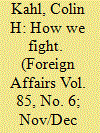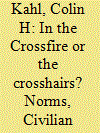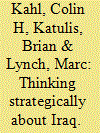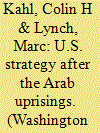|
|
|
Sort Order |
|
|
|
Items / Page
|
|
|
|
|
|
|
| Srl | Item |
| 1 |
ID:
074937


|
|
|
|
|
| Publication |
2006.
|
| Summary/Abstract |
Reports that U.S. troops may have killed 24 civilians in Haditha, Iraq, last November have renewed fears that the U.S. military routinely violates the laws of war. But is the Haditha incident the exception or the rule? In fact, U.S. compliance with noncombatant immunity in Iraq has been relatively high by historical standards, and it has been improving since the beginning of the war.
|
|
|
|
|
|
|
|
|
|
|
|
|
|
|
|
| 2 |
ID:
080682


|
|
|
|
|
| Publication |
2007.
|
| Summary/Abstract |
The belief that U.S. forces regularly violate the norm of noncombatant immunity (i.e., the notion that civilians should not be targeted or disproportionately harmed during hostilities) has been widely held since the outset of the Iraq War. Yet the evidence suggests that the U.S. military has done a better job of respecting noncombatant immunity in Iraq than is commonly thought. It also suggests that compliance has improved over time as the military has adjusted its behavior in response to real and perceived violations of the norm. This behavior is best explained by the internalization of noncombatant immunity within the U.S. military's organizational culture, especially since the Vietnam War. Contemporary U.S. military culture is characterized by an "annihilation-restraint paradox": a commitment to the use of overwhelming but lawful force. The restraint portion of this paradox explains relatively high levels of U.S. adherence with the norm of noncombatant immunity in Iraq, while the tension between annihilation and restraint helps to account for instances of noncompliance and for why Iraqi civilian casualties from U.S. operations, although low by historical standards, have still probably been higher than was militarily necessary or inevitable.
|
|
|
|
|
|
|
|
|
|
|
|
|
|
|
|
| 3 |
ID:
072766


|
|
|
|
|
| Publication |
New Jersey, Princeton University Press, 2006.
|
| Description |
xvi, 333p
|
| Standard Number |
069112406X
|
|
|
|
|
|
|
|
|
|
|
|
Copies: C:1/I:0,R:0,Q:0
Circulation
| Accession# | Call# | Current Location | Status | Policy | Location |
| 051433 | 303.6091724/KAH 051433 | Main | On Shelf | General | |
|
|
|
|
| 4 |
ID:
081340


|
|
|
| 5 |
ID:
130265


|
|
|
|
|
| Publication |
2013.
|
| Summary/Abstract |
Two years into the wave of upheaval sweeping the Arab world, new regional dynamics have become clearer, as have unresolved tensions in current U.S. policy toward the region. Given the scale and velocity of political turmoil associated with the Arab uprisings, the Obama administration has understandably adopted a largely reactive approach, attempting to adjust U.S. policies to a rapidly changing environment. It has been more successful in those efforts than is commonly recognized, maintaining effective pressure against Iran and al-Qaeda while helping to broker meaningful political transitions in Tunisia, Egypt, Yemen, and Libya. But now there is a sense of drift overtaking American strategy for the region. The time has come for the Obama administration to articulate a more coherent, overarching, positive agenda for the new Middle East.
|
|
|
|
|
|
|
|
|
|
|
|
|
|
|
|
|
|
|
|
|